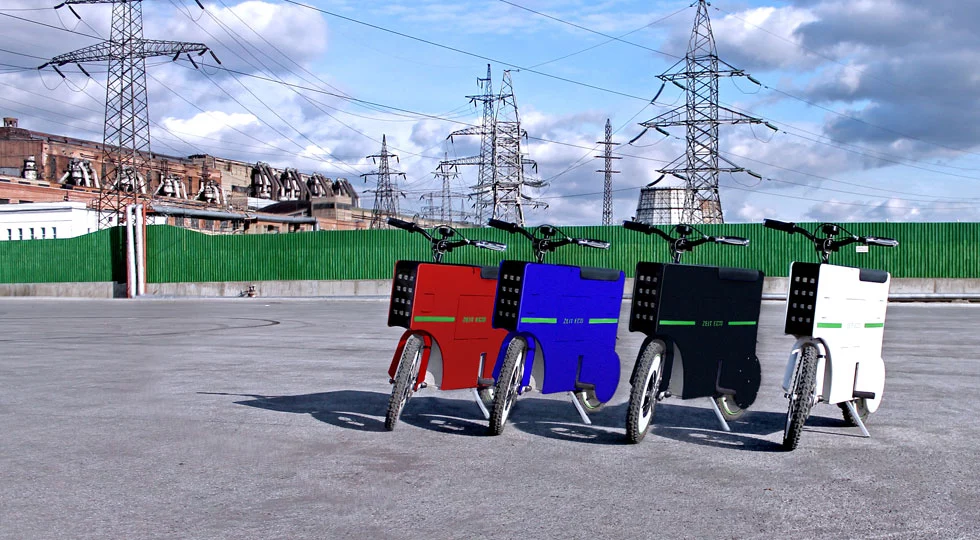Though the Zeit Eco is not the first box-frame-on-wheels e-scooter we've covered, its creators say that this compact last mile transport vehicle has its own unique identity. The hub motor offers an electronically limited top speed of 15 mph (24 km/h), while the standard battery pack should be good for 16 to 25 miles (25 - 40 km) per charge, depending on riding style and road conditions. Its built-in "glove compartment" is big enough to keep a tablet safe from harm during transit, the included handlebar charging port will even help keep mobile device batteries topped up, and the onboard audio system will help keep you entertained while you zip from A to B.
The Zero Emission Individual Transport Eco scooter was designed by engineers Andrey Doroshkov out of Novosibirsk in Russia, and German-born Ilya Shorstov (now living in Novosibirsk). Zeit Eco's New York-based Communications and Marketing Director Anastasiya (Nastya) Blyakher told Gizmag that the electric scooter was originally designed as a personal short haul transport project that was an instant hit among friends.
"First intention was to make one for the personal needs: to travel short distances inexpensively, quickly enough, safely and what's the most important not on foot," she said. "Moreover we wanted to make something that can easily fit in a car, so when we reach the point where the car can't go, we would use the scooter. And of course, we wanted to keep it at home, so it had to be light and compact. For the same reason we also tried to avoid any parts sticking out. A bicycle did not meet all of our requirements so we started working on a scooter. After making a first prototype and showing it to our friends we became very inspired by the idea of making this scooter something more than just a our personal gadget."

According to Blyakher, the basic Zeit Eco design was inspired by the Electric Bike Version 2 design from Yuji Fujimura. While working to build the compact, multifunctional, safe, durable and inexpensive scooter, the team discovered that BOXX was also readying an e-scooter for release, but she added that "although they might seem to look similar, they are completely different in shape and have a different frame."
Currently at the production prototype stage, the Zeit Eco has an aluminum frame with plastic side panels that can be removed for a custom/personalized paint job. The 250 - 350 W brushless geared hub motor gets its power from a 350 Wh LiFePO4 battery, though there is a bigger battery available as an option which could bump that up to 75 miles (120 km). The creators say that the battery can be charged from a standard (110 - 220 V) home outlet, taking around 2.5 hours from empty to capacity.

Tip to tail, the vehicle is just 33 inches (85 cm) long, but the front wheel can be detached, the foot rests folded within the body and the handlebars collapse down for ease of transport. It tips the scales at a manageable 40 pounds (18 kg), stands 45 inches (115 cm) high and is just 5.6 inches (15 cm) thick. That flip-out storage compartment and both front and rear LED lights complete the specs, but we did bring up the question of the design being prone to the unwelcome influence of a crosswind.
"Our calculations and testing showed that the wind will not affect the scooter more than its rider," said Blyakher. "It is also important to remember that the maximum speed is limited to 15 mph and even at this speed Zeit Eco is very stable."
To get the scooter into the hands of consumers, the Zeit Eco team has launched on Kickstarter. Component suppliers have already been sourced, and negotiations with manufacturing facilities are now underway. Pledges to secure a production model start at US$1,700, with delivery estimated to start in November. The funding campaign closes on May 17.
Post-Kickstarter, the e-scooter is expected to cost somewhere in the region of $2,000 (about half the price of the 2013 BOXX) and, as for the question of the Zeit Eco being street legal, the team advises checking with your local transport authority.
The pitch video below shows the vehicle in action.
Source: Zeit Eco, Kickstarter



















